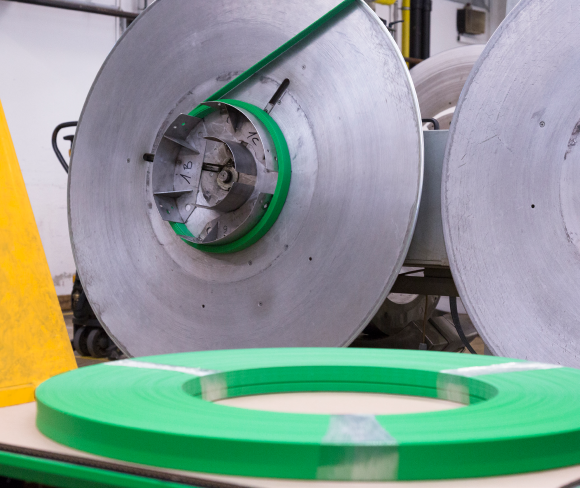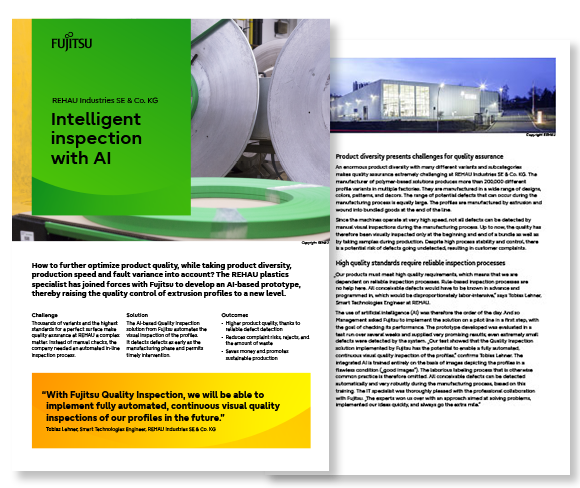REHAU Industries SE & Co. KG Intelligent inspection with AI

How to further optimize product quality, while taking product diversity, production speed and fault variance into account? The REHAU plastics specialist has joined forces with Fujitsu to develop an AI-based prototype, thereby raising the quality control of extrusion profiles to a new level.
Challenges
Thousands of variants and the highest standards for a perfect surface make quality assurance at REHAU a complex matter. Instead of manual checks, the company needed an automated in-line inspection process.
Solutions
The AI-based Quality Inspection solution from Fujitsu automates the visual inspection of the profiles. It detects defects as early as the manufacturing phase and permits timely intervention.
Outcomes
-
Higher product quality, thanks to reliable defect detection
- Reduces complaint risks, rejects, and the amount of waste
- Saves money and promotes sustainable production
"With Fujitsu Quality Inspection, we will be able to implement fully automated, continuous visual quality inspections of our profiles in the future."
Tobias Lehner, Smart Technologies Engineer, REHAU Industries SE & Co. KG

99.32% of all defects are detected by the inspection solution
- Industry: Plastic
- Location: Germany
- People: 12,000
- Customer's website

About the customer
REHAU Industries SE & Co. KG is a leading manufacturer of polymer-based solutions and offers innovative products and services in the areas of building technology, windows, interior design, profiles, cooling, fluid solutions, and railway solutions. As part of the internationally operating REHAU Group, the company employs approximately 12,000 people in more than 54 countries. REHAU Industries SE & Co. KG is headquartered in Rehau, Germany.
An enormous product diversity with many different variants and subcategories makes quality assurance extremely challenging at REHAU Industries SE & Co. KG. The manufacturer of polymer-based solutions produces more than 200,000 different profile variants in multiple factories. They are manufactured in a wide range of designs, colors, patterns, and decors. The range of potential defects that can occur during the manufacturing process is equally large. The profiles are manufactured by extrusion and wound into bundled goods at the end of the line.
Since the machines operate at very high speed, not all defects can be detected by manual visual inspections during the manufacturing process. Up to now, the quality has therefore been visually inspected only at the beginning and end of a bundle as well as by taking samples during production. Despite high process stability and control, there is a potential risk of defects going undetected, resulting in customer complaints.
High quality standards require reliable inspection processes
„Our products must meet high quality requirements, which means that we are dependent on reliable inspection processes. Rule-based inspection processes are no help here. All conceivable defects would have to be known in advance and programmed in, which would be disproportionately labor-intensive,“ says Tobias Lehner, Smart Technologies Engineer at REHAU.
The use of artificial intelligence (AI) was therefore the order of the day. And so Management asked Fujitsu to implement the solution on a pilot line in a first step, with the goal of checking its performance. The prototype developed was evaluated in a test run over several weeks and supplied very promising results; even extremely small defects were detected by the system. „Our test showed that the Quality Inspection solution implemented by Fujitsu has the potential to enable a fully automated, continuous visual quality inspection of the profiles,“ confirms Tobias Lehner. The integrated AI is trained entirely on the basis of images depicting the profiles in a flawless condition („good images“). The laborious labeling process that is otherwise common practice is therefore omitted. All conceivable defects can be detected automatically and very robustly during the manufacturing process, based on this training. The IT specialist was thoroughly pleased with the professional collaboration with Fujitsu. „The experts won us over with an approach aimed at solving problems, implemented our ideas quickly, and always go the extra mile".
Predictive avoidance of defects in the future
„By continuously monitoring and documenting product quality, the solution from Fujitsu also allows any defect-relevant processes to be identified and analyzed. „The findings obtained enable us to eliminate possible defect sources and thereby effectively avoid anomalies in the future. In doing so, we raise product quality to a new level, reduce the risk of complaints, and decrease rejects and thus the amount of waste. This helps lower costs and make production more sustainable. Moreover, we avoid unnecessary shipping, since defective goods can be reliably detected and are not sent to the customer in the first place. Based on the impressive project results, we plan to turn the pilot solution into a productive system in the next step and use it to address additional applications,“ Tobias Lehner concludes.
Related Customer stories




